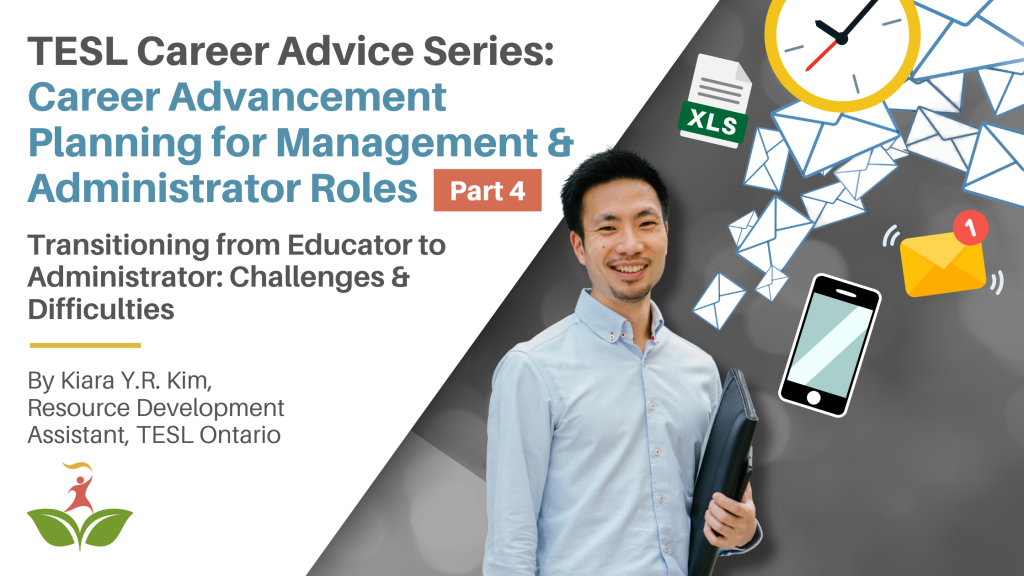By Kiara Y.R. Kim, Resource Development Assistant
Administrative roles are important in the overall management, functioning, and strategic direction of educational institutions. These roles can encompass a wide range of responsibilities that may involve overseeing operations, implementing policies, or managing resources to ensure the overall success of the educational programs and institutions.
Whether you are an educator seeking to broaden your impact on a larger scale, drawn to leadership and mentorship for educators, or motivated for professional growth, embarking on the path from educator to administrator is a journey that demands both ambition and strategic navigation.
In this unique blog series, we explore the pursuit of administrative roles in the field of English Language Training (ELT). TESL Ontario collaborated with six (6) hiring managers representing various sectors of the Ontario ELT landscape, who stand ready to share their experience, advice, and wisdom along this transitional journey. This fourth installment of the series is designed to provide insight into potential challenges and difficulties when transitioning into this role.
Four Challenges Highlighted by Hiring Managers
1. Expectations of the Role: Sometimes, a job isn’t what you thought it would be. Administrative roles may turn out to be more challenging, or unexpected. It is important to recognize that administrative work requires different skillsets than teaching, and that it is essential to invest in yourself and build organizational skills, time-management, leadership, and financial literacy to help achieve your results.
“[New administrators] don’t realize how little of their time will be spent supporting teachers. Many teachers believe they will spend their administrative time helping new teachers with lessons or leading PD workshops. They are surprised when they realize how much of their time is sitting at a desk, writing emails, using spreadsheets, etc.” Director of Studies
“Yes, being a strong educator is not always the same as being a strong administrator. Often the skillsets overlap, but just because you are a creative and well-liked educator, does not necessarily mean that your organizational and financial skills will lead to success in managerial positions. It is important to invest in yourself and build those financial literacy, organizational and leadership skills that can help achieve results.” Department Chair
“Not everyone likes being a supervisor after leaving the classroom! Go with your gut. If it’s not for you, there is no shame in returning to a teaching role or other role in ESL.” Manager, Continuing & Community Education
2. Missing the Classroom: Educators may start missing the classroom once they realize that they don’t have much face time with students. It is important to find ways to stay connected to the classroom, such as through professional development involvement or mentoring new teachers.
“Teachers often start missing the classroom once they realize they won’t have as much face time with people as they did in the past.” Director of Studies
3. Longer Hours and Pressure: As an administrator, you will be responsible for both staff and students, which can be stressful and require longer hours. It is important to build organizational, time-management skills, and develop a good support system and connection with other administrators, colleagues, and mentors around you that you are not afraid to ask for advice or help.
“There are very different timelines and expectations compared with the day-to-day classroom experience. It can seem like juggling many different roles at once, all with the same urgency and time sensitivity. At the same time, it helps to let go of the expectation that ALL of the work will be done and wrapped up in a bow by the end of each day: recognizing that things take time (even while working with deadlines) and can get a little messy or chaotic before their resolution is all part of the grand adventure!” ESL-LINC Coordinator
“Be ready for longer hours and a lot of pressure. You will be responsible for staff, students and others as a supervisor or manager.” Manager, Continuing & Community Education
4. Learning to Manage: Moving into a managerial position also means learning to manage collective groups, navigating complex dynamics, negotiating terms, and setting clear expectations to build successful employment relationships. It is important to learn to be able to manage these conflicts and tensions.
“The switch from unionized position to managerial role is a little tricky.” Interim Associate Director, English Language Institute
Transitioning from a teaching role into an administrative position can be a challenging experience. However, with the right mindset, skills, and support system, teachers can make a successful transition into their new roles.
Visit the TESL Career Centre for essential resources designed to help you navigate the English language education employment landscape.
The Career Connections: 2023 Career Fair and the Career Booster forum took place as part of the 2023 TESL Ontario Annual Virtual Conference that was held on November 9th. While you may have missed it this year, please consider joining us next year for our TESL Ontario Annual Conference and Career Fair.
Kiara Kim is the Resource Development Assistant at TESL Ontario for summer 2023. She is a recent graduate from the University of Toronto, Mississauga, with an HBSc in Anthropology. Throughout her undergrad, she worked actively within university programming and various community research projects in fields of anthropology of health, historical archeology and English language education. She is looking forward to furthering her intersecting interests in research and education.

